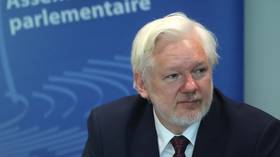‘I pled guilty to journalism’ – Assange

WikiLeaks founder Julian Assange urged European lawmakers to act against rising “transnational repression” of journalism by great powers during an address to the Parliamentary Assembly of the Council of Europe (PACE) on Tuesday. It was his first public appearance since being released from prison in late June.
Assange spent years locked up at a high-security prison in the UK as he fought extradition to the US, which had accused him of unlawfully obtaining and disclosing classified information relating to national defense. In June, he struck a plea bargain with the US Justice Department, formally acknowledging some guilt and waiving the right to legal recourse through, for example, the European Court of Human Rights, in exchange for freedom.
”I want to be totally clear. I am not free today because the system worked. I am free today, after years of incarceration, because I pled guilty to journalism,” he told members of the PACE Legal Affairs Committee in Strasbourg.
Why is Julian Assange at the Parliamentary Assembly of the Council of Europe today and how is his readaptation to the world going? pic.twitter.com/LBGXRklNYq
— WikiLeaks (@wikileaks) October 1, 2024
In his testimony, Assange recounted his legal predicament and what he called a “campaign of retribution” by the CIA under Director Mike Pompeo during the Donald Trump presidency. According to media reports and other materials, the agency conducted an extensive surveillance campaign against the publisher, his family, and associates. It allegedly contemplated kidnapping or killing Assange while he was being protected by political asylum at the Ecuadorian Embassy in London.
Assange said that, while his personal story was harrowing, others in the same situation did not enjoy the same level of publicity and international support. Meanwhile, the world has dramatically changed for the worse since he founded WikiLeaks, he added.
”I see more impunity, more secrecy, more retaliation for telling the truth, and more self-censorship,” he said. “It is hard not to draw a line from the US government’s prosecution of me – its crossing the Rubicon by internationally criminalizing journalism – to the chilled climate for freedom of expression that exists now.”
The US successfully abused European legal proceedings to retaliate against a publisher and has been emboldened to use the same playbook again, as are other countries, Assange claimed.
”When powerful nations feel entitled to target individuals beyond their borders, those individuals do not stand a chance unless there are strong safeguards in place and a state willing to enforce them. Without them, no individual has a hope of defending themselves against the vast resources that a state aggressor can deploy,” he warned.
It’s up to European governments to make sure that “the freedom to speak and the freedom to publish the truth are not privileges enjoyed by a few but rights guaranteed to all,” he concluded.













